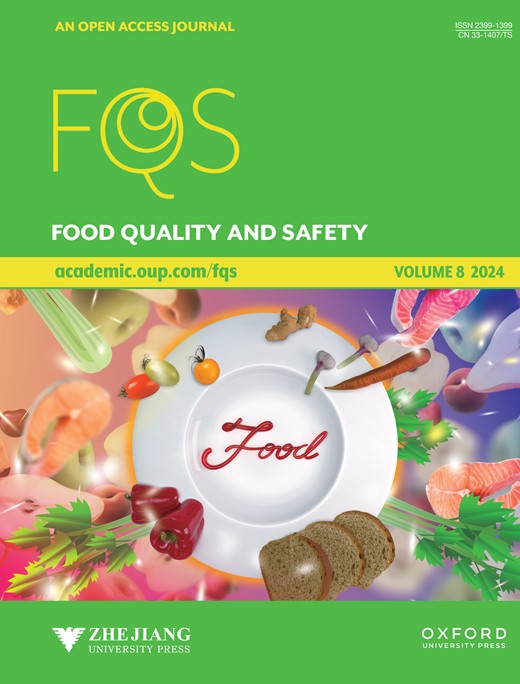1-甲基环丙烯处理对红富士苹果短期贮藏品质的影响
IF 4.4
3区 农林科学
Q2 FOOD SCIENCE & TECHNOLOGY
引用次数: 2
摘要
本研究的目的是确定1-甲基环丙烯(1-MCP)影响短期储存的红富士苹果质量的机制。采用1-MCP(1.0μl/l)处理红富士苹果,在25℃下贮藏0 h、12 h、24 h、48 h、72 h、96 h,测定其乙烯产量。对储存24小时的苹果进行了综合代谢组学和转录组学分析。经过1-MCP处理的红“富士”苹果乙烯释放显著延迟。通过进行转录组和代谢组分析的综合方法,我们鉴定了117个差异表达基因(DEG)和44个差异积累代谢产物(DAM)。通过功能富集分析,我们发现DEGs参与以下途径:碳代谢(LPD2、gpmA、LTA2、ACC、PSAT1、MdCAS2)、植物激素信号转导(EBF1)、氨基酸代谢(MdACS-1)、脂肪酸代谢(LOX1.5、KCS4、KAS1)、能量代谢(Lhcb1、Lhcb6、PsbY、GPDHC1、PUMP5),代谢途径(TRE1、HEXO1)和细胞壁代谢(CSLG2)。因此,这些DEG参与了果实的成熟,并在收获后阶段控制着果实的质量。代谢产物富含DAM。发现它们分别参与代谢途径、次级代谢产物生物合成、苯丙烷生物合成、黄酮类化合物和黄酮醇合成。结果表明,1-MCP抑制乙烯的生物合成,抑制能量代谢。此外,它还下调代谢途径和与果实品质相关的酶基因。因此,1-MCP会延迟果实在收获后阶段的成熟。这项研究有助于我们了解1-MCP处理如何影响水果的成熟和品质。本文章由计算机程序翻译,如有差异,请以英文原文为准。
Effects of 1-methylcyclopropene Treatment on the Quality of Red ‘Fuji’ Apples Fruit during Short-time Storage
The aim of this study is to determine the mechanism through which 1-methylcyclopropene (1-MCP) affects the quality of red ‘Fuji’ apples, which were stored for a short-term duration of time.
Red ‘Fuji’ apples were treated with 1-MCP (1.0 μl/L), stored at 25 ℃ for 0 h, 12 h, 24 h, 48 h, 72 h, 96 h, and ethylene production was measured. An integrated metabolomic and transcriptomic analysis was performed on apples stored for 24 h.
The release of ethylene was significantly delayed from red “Fuji” apples, which were subjected to 1-MCP treatment. By performing an integrated method of transcriptome and metabolome analyses, we identified 117 differentially expressed genes (DEGs) and 44 differentially accumulated metabolites (DAMs). By performing functional enrichment analysis, we found that DEGs were involved in the following pathways: carbon metabolism (LPD2, gpmA, LTA2, ACC, PSAT1, MdCAS2), phytohormone signal transduction (EBF1), amino acid metabolism (MdACS-1), fatty acid metabolism (LOX1.5, KCS4, KAS1), energy metabolism (Lhcb1, Lhcb6, PsbY, GPDHC1, PUMP5), metabolic pathways (TRE1, HEXO1) and cell wall metabolism (CSLG2). Thus, these DEGs were involved in the ripening of fruits, and they controlled the quality of fruits at the post-harvest stage. The metabolites were enriched with DAMs. These were found to be individually involved in the metabolic pathway, secondary metabolite biosynthesis, phenylpropanoid biosynthesis, flavonoids, and flavonol synthesis.
The results indicate that 1-MCP inhibits the biosynthesis of ethylene and suppresses energy metabolism. Moreover, it also down-regulates metabolic pathways and the enzymatic genes related to fruit quality. Therefore, 1-MCP delays the ripening of fruits at the post-harvest stage. The study helps us understand how 1-MCP treatment affects the ripening and quality of fruits.
求助全文
通过发布文献求助,成功后即可免费获取论文全文。
去求助
来源期刊

Food Quality and Safety
FOOD SCIENCE & TECHNOLOGY-
CiteScore
7.20
自引率
1.80%
发文量
31
审稿时长
5 weeks
期刊介绍:
Food quality and safety are the main targets of investigation in food production. Therefore, reliable paths to detect, identify, quantify, characterize and monitor quality and safety issues occurring in food are of great interest.
Food Quality and Safety is an open access, international, peer-reviewed journal providing a platform to highlight emerging and innovative science and technology in the agro-food field, publishing up-to-date research in the areas of food quality and safety, food nutrition and human health. It promotes food and health equity which will consequently promote public health and combat diseases.
The journal is an effective channel of communication between food scientists, nutritionists, public health professionals, food producers, food marketers, policy makers, governmental and non-governmental agencies, and others concerned with the food safety, nutrition and public health dimensions.
The journal accepts original research articles, review papers, technical reports, case studies, conference reports, and book reviews articles.
 求助内容:
求助内容: 应助结果提醒方式:
应助结果提醒方式:


